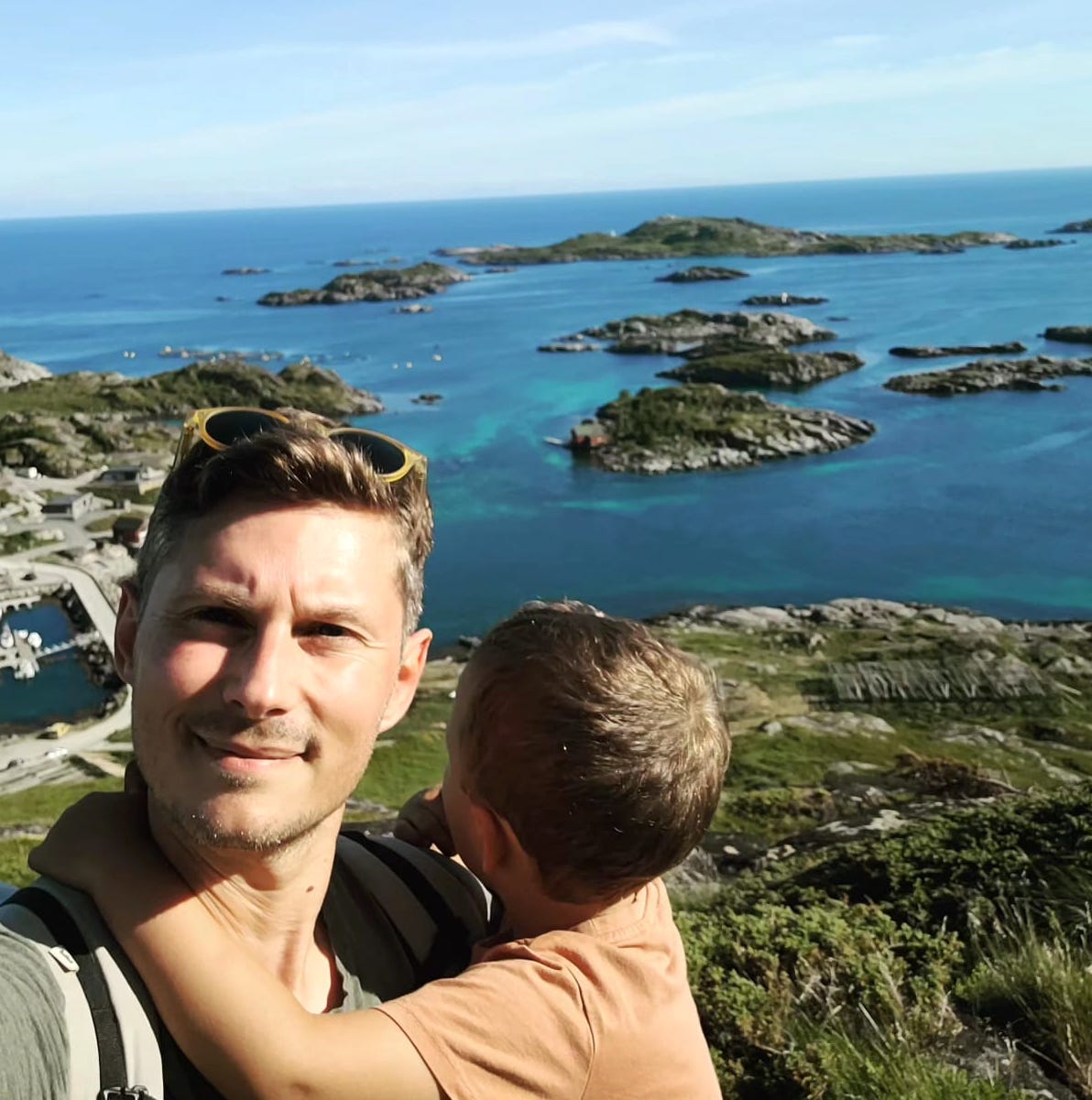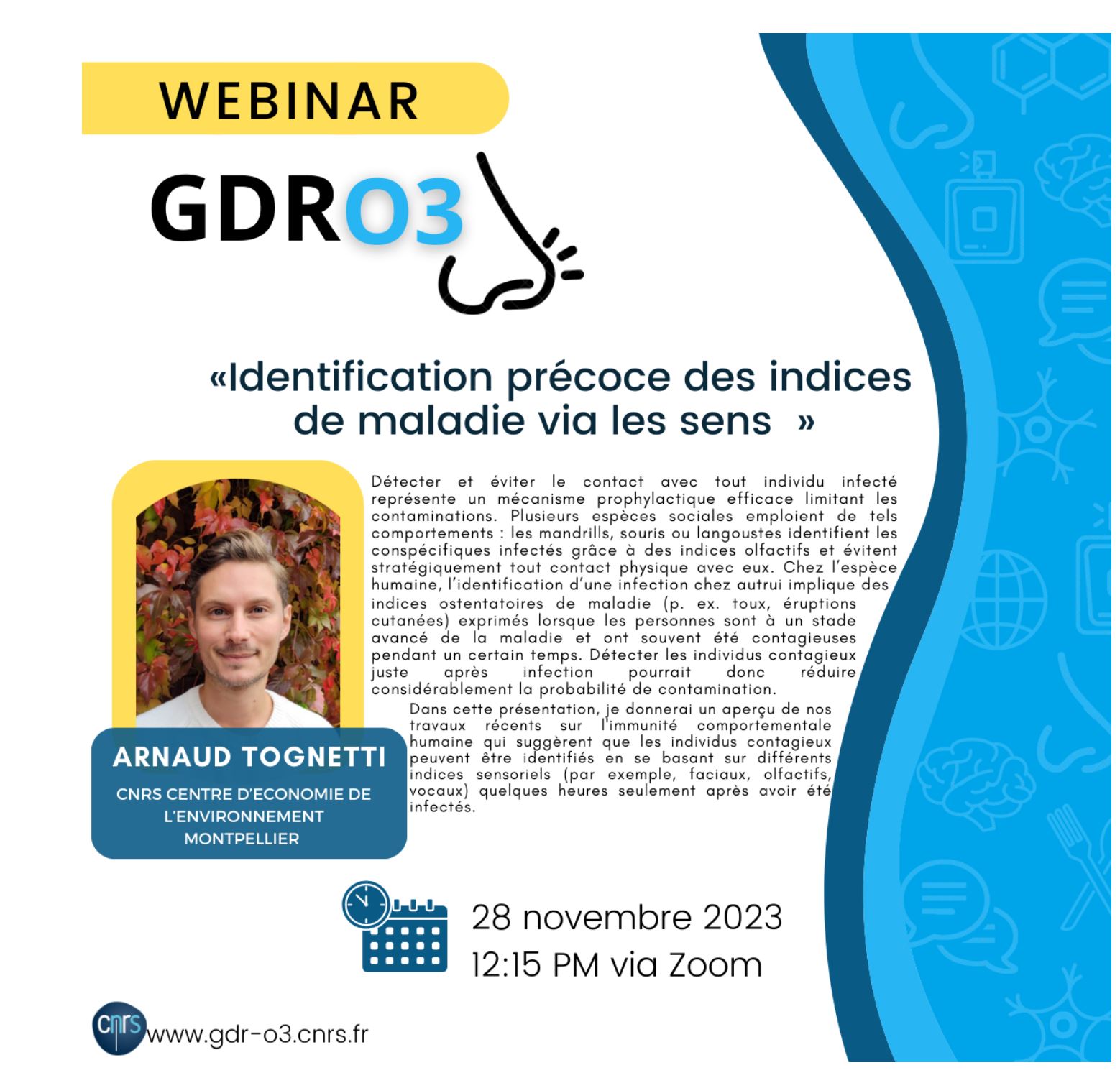Arnaud Tognetti
My research focuses on the evolutionary and psychological mechanisms underlying human sociality, adopting interdisciplinary approaches at the intersection of evolutionary anthropology, behavioral ecology, experimental psychology and behavioral economics.
My current main research project explores human behavioral immunity, a facet of our sociality linked to the infectious risk imposed by group living, favoring pathogen transmission through increased physical proximity to infected individuals. The aim is to better understand our behavioral immune system, by examining whether humans, like other social species, are able to detect sick conspecifics through phenotypic cues such as facial features or body odors, and whether the perception of these signals induces avoidance behaviors and influences interpersonal decision-making. This research project is being carried out in close collaboration with Mats J. Olsson, Julie Lasselin and Mats Lekander of the Karolinska Institutet in Stockholm, Sweden.
My previous research has focused on cooperation, addressing topics such as the influence of sexual selection on the evolution of cooperation, the existence of phenotypic cues to cooperation, and the role of hormones in cooperative behavior. I have also extended the scope of my research to interspecific comparisons, testing the influence of the propensity to cooperate on mate choice in two other social species, the gleaner mouse(Mus spicilegus) and social weavers(Philetairus socius).
For more information on my research, please see my Google Scholar page and my personal web page.
- Rita Covas, Sophie Lardy, Liliana R. Silva, Benjamin Rey, André C. Ferreira, et al.. The oxidative cost of helping and its minimization in a cooperative breeder.. Behavioral Ecology, 2022, 33 (3), pp.504-517. ⟨10.1093/beheco/arab152⟩. ⟨hal-03693496⟩
- Kathrin Ohla, M.G. Veldhuizen, Tomer Green, M.E. Hannum, A.J. Bakke, et al.. A follow-up on quantitative and qualitative olfactory dysfunction and other symptoms in patients recovering from COVID-19 smell loss. Rhinology, 2022, 60 (3), pp.207-2017. ⟨10.4193/rhin21.415⟩. ⟨halshs-03923537⟩
- Arnaud Tognetti, Valérie Durand, Dimitri Dubois, Melissa Barkat-Defradas, Astrid Hopfensitz, et al.. The smell of cooperativeness : Do human body odours advertise cooperative behaviours?. British Journal of Psychology, 2022, 113 (2), pp.531-546. ⟨10.1111/bjop.12544⟩. ⟨hal-03654936⟩
- Arnaud Tognetti, Georgia Sarolidou, Julie Lasselin, Mats Lekander, Mats J Olsson, et al.. Acute Systemic Experimental Inflammation Does Not Reduce Human Odor Identification Performance. Chemical Senses, 2021, 46, pp.1-7. ⟨10.1093/chemse/bjab004⟩. ⟨hal-04361193⟩
- Arnaud Tognetti, David Doat, Dimitri Dubois, Rustam Romaniuc. The effect of physical disability on group cooperation: Experimental evidence. Bulletin of Economic Research, 2021, 74 (1), pp.308-316. ⟨10.1111/boer.12290⟩. ⟨hal-03227254⟩
- Arnaud Tognetti, Valérie Durand, Melissa Barkat-Defradas, Astrid Hopfensitz. Does he sound cooperative? Acoustic correlates of cooperativeness. British Journal of Psychology, 2020, 111 (4), pp.823-839. ⟨10.1111/bjop.12437⟩. ⟨hal-03169806⟩
- Georgia Sarolidou, Arnaud Tognetti, Julie Lasselin, Christina Regenbogen, Johan N Lundström, et al.. Olfactory Communication of Sickness Cues in Respiratory Infection. Frontiers in Psychology, 2020, 11, pp.1004. ⟨10.3389/fpsyg.2020.01004⟩. ⟨hal-04361173⟩
- Alexandre Suire, Arnaud Tognetti, Valérie Durand, Michel Raymond, Melissa Barkat-Defradas. Speech Acoustic Features: A Comparison of Gay Men, Heterosexual Men, and Heterosexual Women. Archives of Sexual Behavior, 2020, ⟨10.1007/s10508-020-01665-3⟩. ⟨hal-02528875⟩
- Denis Pierron, Harilanto Razafindrazaka, Arnaud Tognetti, Astrid Hopfensitz. Mieux comprendre le don de sang. La piste des mécanismes biologiques et cognitifs. Enjeux et défis. EFS Etablissement Français du sang, EFS, Mar 2020, Paris, France. ⟨halshs-03831469⟩
- Arnaud Tognetti, David Doat, Dimitri Dubois, Rustam Romaniuc. Does the presence of a physically disabled person in the group increase cooperation? An experimental test of the empathyaltruism hypothesis. 2019. ⟨halshs-02103832⟩
Perception of unfamiliar caregivers during sickness - Using the new Caregiver Perception Task (CgPT) during experimental endotoxemia
High prevalence of long-term olfactory disorders in healthcare workers after COVID- 19: A case-control study



